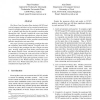188 search results - page 20 / 38 » Back to the Complexity of Universal Programs |
SODA
2000
ACM
13 years 8 months ago
2000
ACM
We present a model that enables us to analyze the running time of an algorithm on a computer with a memory hierarchy with limited associativity, in terms of various cache parameter...
WORDS
2002
IEEE
14 years 9 days ago
2002
IEEE
The Worst-Case Execution-Time Analysis (WCET Analysis) of program code that is to be executed on modern processors is a highly complex task. First, it involves path analysis, to i...
IPPS
1997
IEEE
13 years 11 months ago
1997
IEEE
This paper describes a framework for providing the ability to use multiple specialized data parallel libraries and/or languages within a single application. The ability to use mul...
TOPLAS
2008
13 years 7 months ago
2008
lem of inferring termination from such abstract information is not the halting problem for programs and may well be decidable. If this is the case, the decision algorithm forms a &...
POPL
2011
ACM
12 years 10 months ago
2011
ACM
We define a new logic, STRAND, that allows reasoning with heapmanipulating programs using deductive verification and SMT solvers. STRAND logic (“STRucture ANd Data” logic) f...

